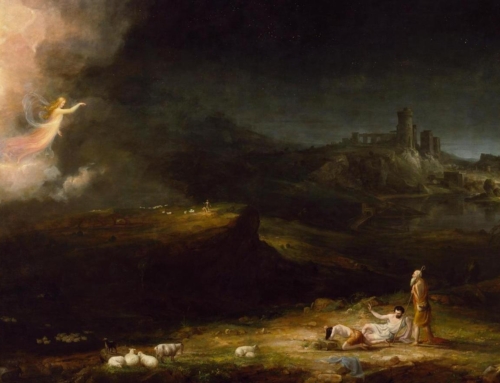When the LORD began to speak with Hosea, the LORD said to Hosea: Go, get for yourself a woman of prostitution and children of prostitution, for the land prostitutes itself, turning away from the LORD.
—Hosea 1:2The LORD said to me in the days of King Josiah: Do you see what rebellious Israel has done? She has gone up every high mountain, and under every green tree she has played the prostitute… With her casual prostitution, she polluted the land, committing adultery with stone and wood.
—Jeremiah 3:6, 9Then one of the seven angels who were holding the seven bowls came and said to me, “Come here. I will show you the judgment on the great harlot who lives near the many waters. The kings of the earth have had intercourse with her, and the inhabitants of the earth became drunk on the wine of her harlotry.” Then he carried me away in spirit to a deserted place where I saw a woman seated on a scarlet beast that was covered with blasphemous names, with seven heads and ten horns.
—Revelation 17:1-3
Marital fidelity or infidelity is a very important image in the Old Testament, and in the Book of Revelation as well. Faithful marriage is a good in its own right, and adultery a serious sin, but they are also potent symbols of larger spiritual realities: fidelity and infidelity to the covenant with God.
In the Old Testament we see that some adultery is entirely figurative, as in the Jeremiah passage above, where the referent of the word is clearly idolatry. Therefore when we hear in the Book of Revelation about “virgins” and “harlots,” we should not immediately jump to the conclusion that they are virgins and harlots in the ordinary, everyday sense, but we should ask whether they are rather symbols of spiritual realities.
But that doesn’t mean that sexual morality itself is irrelevant to the spiritual life or the Book of Revelation. Because adultery is never “just” a wrong against one’s spouse but also a sin against God, sexual immorality and abandonment of God are inextricably linked. Sins against temperance may be the kind of sin that least directly attacks God as God. But they are the most dangerous because they are so appealing, and they can certainly be mortal sins. And if one becomes attached enough to the sin to decide not to accept the grace of repentance and return to the life of sanctifying grace, how can one hope to stand fast against further and greater sins that oppose God more and more directly?
Thus we read in the Book of Numbers:
While Israel was living at Shittim, the people profaned themselves by prostituting themselves with the Moabite women. These then invited the people to the sacrifices of their god, and the people ate of the sacrifices and bowed down to their god. Israel thereby attached itself to the Baal of Peor, and the LORD’s anger flared up against Israel.
—Numbers 25:1-2
Our enemy the Devil, who “prowls about like a roaring lion,” knows that if we’re living the Christian life, he probably can’t get us to renounce Christ and become a hardened apostate all in one go. That’s not very appealing. But if he can get us to be unwilling to be sorry for a serious sin that misuses something that is very pleasurable and appealing, such as sex, the possibility opens up for him to maneuver us into obstinate opposition to Christ and his Church.
Thus, in the Bible, sexual morality is seen to be the tip of an iceberg, the visible part of a larger spiritual war that is invisible—but which the Book of Revelation makes visible.
Image: Henri de Toulouse-Lautrec, Au Salon de la rue des Moulins







